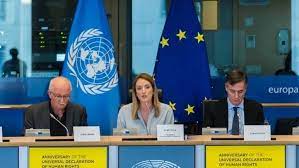EU reaches agreement to overhaul migration system, tighten asylum rules

Brussels: The European Union has reached an agreement on reforms designed to share the cost of hosting migrants and refugees, and limit the numbers of people coming in to the bloc after years of discussion on how to overhaul its outdated asylum rules.
Envoys from member countries, the EU parliament and the executive branch, the European Commission, “reached a deal on the core political elements” of the Pact on Migration and Asylum, the EU’s Spanish presidency said in a statement on Wednesday after a night of negotiations.
Dozens of refugee rights groups have said the deal will create a “cruel system” that is unworkable and will cause what would amount to prison camps at the EU’s borders.
The reform includes speedier vetting of irregular arrivals, creating border detention centres, accelerated deportation for rejected asylum applicants and a solidarity mechanism to take pressure off southern countries experiencing big inflows of migrants.
Amnesty International said the agreement “will set back European asylum law for decades” and its “likely outcome is a surge in suffering on every step of a person’s journey to seek asylum in the EU” as it is “designed to make it harder for people to access safety”.
The accord still needs to be formally approved by the European Council, representing the 27 member nations, and the European Parliament, before it enters the bloc’s lawbooks, likely in 2024.
“The EU reached a landmark agreement on a new set of rules to manage migration and asylum,” Roberta Metsola, president of the European Parliament, said on X.
European Commission chief Ursula von der Leyen said “migration is a common European challenge – today’s decision will allow us to manage it together”.
Migrant arrivals in the EU are way down from the 2015 peak of more than one million people, but have steadily crept up from a 2020 low to 255,000 in the year to November, with more than half crossing the Mediterranean from Africa to Italy or Malta.
Previous efforts to share the responsibility for hosting migrants and refugees have floundered because eastern EU members in particular were unwilling to take in people who had arrived in Greece, Italy and other countries.
Under the new system, countries not at the border will have a choice between accepting asylum seekers or paying into an EU fund.
An accelerated filtering and vetting system will be put in place so those deemed ineligible can be quickly sent back to their home country or country of transit.
People whose asylum applications have a low chance of success, such as those from India, Tunisia or Turkey, can be prevented from entering the bloc and held in detention centres at the border, as can people who are seen as representing a threat to security.
Dozens of charities that help migrants and refugees – including Amnesty International, Oxfam, Caritas and Save the Children – have criticised the pact, saying in an open letter (PDF) that the package will “mirror the failed approaches of the past and worsen their consequences”.
“If adopted in its current format, it will normalise the arbitrary use of immigration detention, including for children and families, increase racial profiling, use ‘crisis’ procedures to enable pushbacks, and return individuals to so called ‘safe third countries’ where they are at risk of violence, torture, and arbitrary imprisonment,” the letter by 56 NGOs said.
“We should strengthen, not weaken, our reception and asylum systems and provide mechanisms to fairly share responsibility between European states,” it added.
Amnesty also noted that the agreement reinforces the EU’s dependence on states beyond its borders to manage migration, building on recent deals with Albania, Libya, Tunisia and Turkey.
“Rather than investing in dignified reception within the EU and expanding safe and regular pathways to allow people to reach protection in Europe without relying on dangerous journeys, this amounts to a further step towards externalising border control and evading Europe’s refugee protection responsibilities,” it said.





